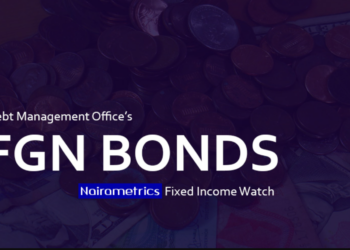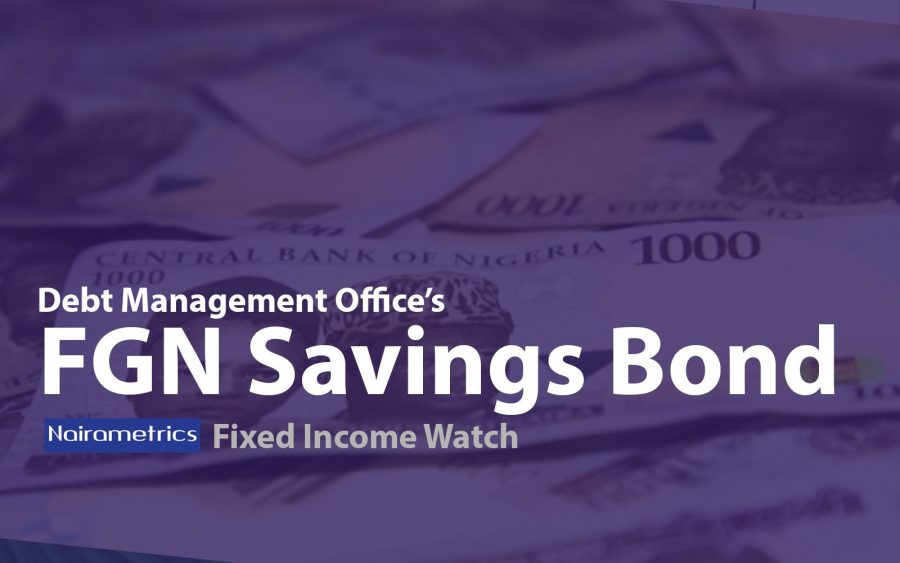This articles explains what an FGN Bond is and how you can invest in one.
What is a Bond?
A bond is a contract between a lender and a borrower, whereby the borrower agrees to pay the lender interest and repay principal at stipulated periods. It’s similar to an IOU, issued by the Government or a Corporate institution as a way of raising funds for particular projects.
What is an FGN Bond?
FGN Bonds are Debt instruments or contracts issued by the Federal Government of Nigeria for an agreed period of time. The investor lends an amount of money to the government and earns interest on the investment until the maturity of the bond when the initial payments will be returned.
What are the Benefits of an FGN Bond?
1. Tax free Income: interest received on FGN Bonds is not subject to withholding tax, company income tax, etc.
2. High and stable returns
3. Free from default risk: repayment is guaranteed at the maturity of the FGN Bond
4. Collateral for borrowing: the FGN Bond can be used as collateral to raise financing.
5. Easily Tradable as it has a unique quality of being quoted on the Nigerian Stock Exchange and can also be traded over the counter (OTC)
Who Can Invest in FGN Bonds?
Anyone can invest in a FGN bond. They can be individuals or corporate bodies.
When does the Government Issue Bonds?
The Government via the Debt Management Office DMO will first issue a primary auction. Freshly issued bonds usually takes place on the third Wednesday of every month.
Where Can I Buy an FGN?
You can buy from the following PMI’s. Just go to any of their branches and request for a form and guidance
Access Bank Plc.
Corronation Merchant Bank.
CitiBank Nigeria Ltd.
Consolidated Discounts Ltd.
Ecobank Nigeria Plc.
Fidelity Bank Plc.
First Bank of Nigeria Plc.
First City Monument Bank Plc.
FSDH Merchant Bank Ltd.
Guaranty Trust Bank Plc.
FBN Merchant Bank Ltd
Stanbic IBTC Bank Plc.
Standard Chartered Bank Nigeria Ltd.
Union Bank of Nigeria Plc.
United Bank for Africa Plc.
Zenith Bank Plc.
FGN Bonds have maturity years ranging from 5 years to 10 years to 20 years. The maturity of a bond is the number of years remaining for an already issued bond to mature (due for payment of principal)
How do I invest in FGN Bonds?
You can invest in bonds through a Primary Dealer/market maker (PD/MMs). PD/MMs can be banks, investment houses, brokers etc. . To invest you approach your chosen PD/MMs and fill a form. In the form you fill your Personal Information, bank details for payment of your interest, CSCS nos, the amount you wish to invest, your bid interest rate and then sign. You can invest a minimum of N10,000 and multiples of N1,000 thereafter.
Why do I have to bid interest?
FGN Bonds are sold via an auction system where investors quote interest rates for bonds they wish to buy. As such, bond applications with interest rates that are below the minimum average interest rates otherwise called the marginal rate quoted are accepted and those higher may be rejected. For example, if the average minimum interest rate is 12% then bids below 12% will be accepted. Therefore different investors can have different interest rates provided it falls below the minimum average bid price. Someone can have 10% another 11%, 9%, 10.5% etc.
What is the Marginal Rate for Bonds and How does it work?
Bonds like any other asset is affected by the interest rate pressures. As such despite the coupon rates the FG indicates it will pay bond purchasers and sellers determine the price of a bond based its expected yield. For example, FG Offer for sale FGN Bond with a coupon rate of 10%. As such N100 unit (bond price) of the bond will earn N10 in coupon interest. However, when you are about to buy the marginal rate determines the price you pay. So, if the marginal rate is 13%, you pay N76.9 for a bond with a Face Value of N100 per unit.
This is derived at by dividing the fixed coupon N10 by the expected yield 13% (10/0.13) to arrive at N76.9. As such the N10 coupon that will produce a yield of 13% will be based on a price of N76.9. So basically when the yield is higher than the coupon the bond price is sold at a discount and when the premium is higher than the yield the bond price is sold at a premium.
What if I lose my bid is there still a way I can buy?
You can buy or sell bonds at the secondary market. So for those who do not wish to hold to maturity they can just go to the Over The Counter (OTC) market on the floor of the Nigerian Stock Exchange and buy. The secondary market is open from 10am to 2pm Monday to Friday. The minimum investments are 50 million and 100 million per transaction.
How Quickly Can I convert Bonds to Cash?
If you do not wish to hold to maturity, you can convert bonds to cash to selling on the secondary market through your PD/MMS who are mandated to give a two-way bid/offer price. Because bonds are typically stated in of 50million and 100million amounts below are generally illiquid in the secondary market and are sold on a best effort basis.
When is the interest paid?
The coupon Interest on FGN Bonds are paid semi annually.
Where will my Interest Payment be paid to?
Your interest payment will be credited to the account that you indicated when you filled the form.
Can my interest payments be rolled over on top of the principal?
No. The coupon is not rolled over automatically. It is credited to your accounts as cash. However, you can then use the interest to purchase the next round of bond sales should you want to enjoy the benefits of compounding interest.
Are the Interests Tax Free?
Yes it is Tax free as you do not pay tax on the interest
What Security do I have?
FGN Bonds are secured by the full faith and credit of the Federal Government of Nigeria. Their default capability is close to zero
What affects the Bond Price?
The Bond price is affected by the yield. The higher the yield the lower the price. For example a Bond Price originally cost N100 at 10% coupon rate (N10 interest). The price drops to N90 due to forces of demand and supply. The yield is therefore the N10 divided by the N90 0r 11.1% price in the hand of a new purchaser.
What other Factors affect Bond Price?
a. The credit status of the issuer
b. The forces of demand & supply of such securities
c. The inflation and interest rate movements
d. Activities and performances of the equities market.
Note: Information from DMO and Zenith Bank website was used in writing this article
This article originally appeared on Nairametrics on the 8th of September 2013. It has now been updated

















It good but it could be better if it could be systematic because from what as be said one need to be going to the bank as often as possible
Luxury tax: it will work and help us to reduce some level of unnecessary taste for luxury items in a country of very many poor people. The big business owners do not go much for luxury items like government business persons and top civil servants or administrators. Their taste for luxury is fuelled by easy money not by hard earned income. Even if what accrue to government is “miniscule”, it may help the society to lower craze for acquisition of wealth way beyond our need (that is being stored in houses not in commercial ventures). A person that do not need more than 4 plots of land will not acquire 12 plots if he/she will be taxed for ownership of such a number of plots extra. Acquiring 8 un-necessary/unused plots denies the society and makes land acquisition more difficult for others.
Okay say hypothetically, I want to invest a million naira in government bonds, for a 3 year period, what would be my interest rates and when would you advice me to invest?
Please,how can I invest in government Bond, give me details
i really do not understand all these grammar can you in a lay man’s language explain the all and rudiments of this bond investment to me? this is because my dad wants to invest and he needs me to explain in details to him before he ventures.